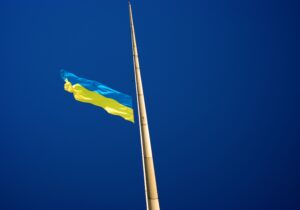In late 2023 three Congressional committees – the Foreign Affairs Committee, the House Armed Services Committee, and the House Permanent Select Committee on Intelligence – published jointly perhaps the most significant document of our day that few have even heard of. Under the title “Proposed Plan for Victory in Ukraine,” this 28-page document was drafted by the three chairmen of these respective committees: Rep. Michael McCaul (R-TX), Rep. Mike Rogers (R-AL), and Rep. Mike Turner (R-OH).
Consisting of five parts, the document attempts to answer why the U.S. should support Ukraine in her war against Russia. The war is understood to be a “bellwether” to determine whether free nations – and the U.S. in particular – “can stand up to unprovoked aggression” and the growing totalitarian menace. The report’s cover photo, tellingly, shows four dictators standing side-by-side: Vladimir Putin, China’s Xi Jinping, Supreme Leader of Iran Ali Khameini, and Alexander Lukashenko of Belarus.
The report begins by critiquing the new “axis of evil,” in which Russia, China, Iran, North Korea, Cuba, and Venezuela each play a significant role. Russia’s invasion of Ukraine is said to be “eerily reminiscent” of Poland of 1939, whereby free nations were engaged in “appeasing the dictator.” The report is candid: “All our adversaries are watching. If Biden can’t stop the Taliban, Iran and its proxies, or Putin, how will he deter Xi Jinping?”
In addition to their assessment of the authoritarian threat, the authors provide an overview of existing financial accountability measures as well as a detailed analysis of new accountability measures put forward in several appropriations bills. The report also offers a statistical breakdown mirroring the burden-sharing of European nations over against the U.S. in the war. Not surprisingly, the Baltic states, Poland, and Scandinavia have contributed, percentage-wide, the greatest amount of aid to Ukraine – between 1.16 % and 1.82 % of their respective GDPs. U.S. aid to Ukraine to the present stands at .33% of our GDP.
The authors are unsparing in their evaluation of the Biden administration’s philosophy of “as long as it takes,” which – they lament – is “a losing strategy.” And, as of late, “as long as it takes” has in reality become “as long as we can.” By their account, the Biden Administration is at fault for engaging in foot-dragging and denial in the face of Ukraine’s immediate needs. As damning evidence thereof, the report offers a detailed timeline up to the present showing continual delays at virtually every stage of providing sufficient weaponry; it is this propensity for delay and excuse-making, the authors insist, that has prolonged the war. As Ukraine’s principal supporter, the U.S. has been indecisive and unpunctual.
And it is hard to disagree. Ever since the war’s beginning, Western leaders, including the U.S., have withheld strategic weaponry that would enable Ukraine’s success. Such self-deterrence is rooted in a “fear of escalation,” which Vladimir Putin has exploited with cunning, even to the extent of nuclear blackmail. But as Ukrainian President Zelensky reminded his audience at the recent World Economic Forum in Switzerland, the West must dispel this crippling fear, which projects weakness. “Nothing has harmed our coalition more,” he insisted. Moscow senses in the West a lack of resolve.
A credible plan for winning the war is hence imperative. The path to victory, according to the report, requires three broader strategies: (1) tightening sanctions on the Russian regime, (2) transferring frozen Russian sovereign assets to Ukraine, and most immediately, (3) providing critical weapons to Ukraine “at the speed of relevance.”
This means, quite practically, shirking the pattern of “debilitating hesitation” and arming Ukraine with the weapons it needs to win “as soon as possible.” To delay means “costing Ukrainian lives and the American taxpayer.” As it concerns the battlefield, three priorities need the highest attention if we take the goal of victory seriously: providing “the longest-range variants” of ATACMS missiles, F-16 fighter jets, and sufficient quantities of cluster munitions, artillery, air defense, and armor to make a difference on the battlefield.
The report comes at a time when many, regardless of political affiliation, either have “Ukraine fatigue” two years into the formal war or have been deluded by isolationist thinking, as is the case among an influential number of House Republicans who have wrongly made any aid contingent upon concessions on the U.S. “border crisis.” The report forces upon its readers the question of whether the U.S. can in fact implement a victory plan. Does the U.S. have the necessary vision? Do we care to defend the defenseless against its authoritarian neighbor? And do we understand the global implications of the Russian invasion of Ukraine? If we cut off aid and Ukraine is forced to accept a Russian victory, the result will only be the prelude to a new and more cataclysmic global war.
Ukrainians already stand in crisis – an existential crisis, by which a Putin victory spells Ukraine’s disappearance. Through our delays in providing the Ukrainians with the strategic weapons she needs to win the war and through isolationist tendencies on our part, we cause Ukraine further suffering. Further suffering, that is, in addition to the two years of hell and crimes against humanity due to a war she did not choose.
And what precisely are the crimes against humanity Ukraine has endured for the last two years? In addition to the roughly 70,000 Ukrainians killed thus far, there has been the destruction of the country’s civilian infrastructure, millions of refugees, widows, and orphans, the deportation of tens of thousands of Ukrainian children to Russian “re-education” camps, and untold and innumerable war crimes, including executions, torture, and rape.
The report omits one critical element in establishing a moral justification for U.S. support in the “victory” plan. It is none other than the guarantees to Ukraine which were made by signatories to the Budapest Memorandum of 1994. Remarkably, the U.S. joined the U.K. as well as the Russian Federation in promising to respect Ukraine’s “sovereignty” and “territorial integrity.” Russia certainly has not upheld her end of the deal, but that doesn’t mean we shouldn’t honor our word.
Chairman McCaul’s concluding exhortation needs amplifying: “the power vacuum of a Putin victory would usher in a more dangerous world for the U.S. and our allies and partners.” As Japanese Prime Minister Fumio Kishida has rightly warned, “Ukraine today may be East Asia tomorrow.” Vice President-elect of Taiwan Hsiao Bi-Khim is more direct: “Ukraine’s survival is Taiwan’s survival.” As the document notes, U.S. action or inaction “would signal to Xi that U.S. resolve can be broken,” guaranteeing disastrous repercussions that are global in reach.
The wisdom of the ages reminds free nations: to be weak is to invite war; to be strong is to prevent it. While the U.S. dithers, the future of the world is being decided in Ukraine. A credible victory plan is desperately needed. In the words of the Atlantic Council’s Peter Dickinson, a war-winning strategy means abandoning our own “self-imposed red lines” and “finally providing Ukraine with the tools to finish the job.” Because fear of Russian escalation is Putin’s secret weapon,” it is high time that he be disarmed. “The United States can carry the torch of freedom, democracy, and human rights, or she can retreat into a false sense of security.” The choice is ours, and the time for acting is now.







 Sponsor a student for Christianity & National Security 2024
Sponsor a student for Christianity & National Security 2024